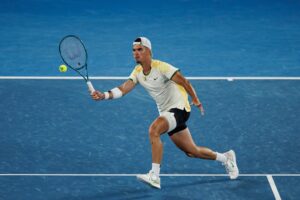Richard Krajicek triumphing at the All England Club in 1996 was certainly as a surprise result and might almost be dismissed as a fluke, as he could neither repeat the feat at the , or for that matter in any other Grand Slam competition during the course of his career. However, there can be no question mark raised about which victory was the most significant en route to the most memorable success of his professional career.
In the final analysis Pete Sampras’ three-year domination, and a 25-match win streak at the All England Club, ended with the longest and arguably the most frustrating match of his life. It was a 30-hour ordeal that left the American looking helpless and hopeless, possibly for the only time in his illustrated career. Sampras had already dropped two sets when he took to the court for a second day. His quarterfinal encounter had spilt over to the following day, thanks to the typically irritating weather in London.
However, it was only a matter of 23 minutes before the American’s title defense was over. His hopes for a fourth straight title lay in shambles. Sampras’ opponent over the two days had been a Dutchman who was arguably the only player who could boast of an upper hand over him. It stayed that way with Richard Krajicek winning in straight sets. The 7-5 7-6 (7-3) 6-4 win helped the Dutchman seal a spot in the semifinals. He would go on to win the tournament.
In his autobiography, A Champion’s Mind, Sampras describes Krajicek as “the rangy, tall, hard-serving Dutchman who was always a threat on fast surfaces. He could pop up at any time and win a tournament. At other times, he was just another big guy with a good serve who didn’t seem to have the confidence or drive to win, week in, week out.”
Dutch delight
The Rotterdam-born player’s prior record at the All England Club was anything but enviable. He had won only seven matches while being at the receiving end in five. He had been a first-round loser for the past two years. In 1996 though Krajicek caused twin upsets in a matter of days. He first took out 1991 champion Michael Stich of Germany in straight sets, in the fourth round. Then he got that memorable quarterfinal win over Sampras.
Sampras’ exit ensured one of the most bizarre men’s singles semifinal line-ups at Wimbledon ever. Krajicek faced Australian journeyman Jason Stoltenberg in one. In the second Americans Todd Martin, who at No. 13 was the highest seed left, and MaliVai Washington battled it out. No points for guessing none of the four gentlemen had ever lifted a Grand Slam trophy. Martin had albeit played in a final, losing to Sampras at the Australian Open in 1994.
There was no second final for him though as Washington won 10-8 in the fifth. Krajicek had a comfortable straight sets win over Stoltenberg. He lost just eight games, albeit two more than it had cost him to win their opening round encounter at the Australian Open that year. The final, despite featuring two first-timers, was surprisingly one-sided. A 6-3 6-4 6-3 win ensured Krajicek his maiden Grand Slam title.
A surprise win…or a fluke
It was a memorable success in more ways than one.
Coming into the Wimbledon that year Krajicek had not won a title of any kind for 14 months, and had never previously won a top level title. His biggest titles were the three Championship Series – the precursor to ATP World Tour 500 tournaments – tournaments in Barcelona and Sydney (both 1994) and Stuttgart (1995). The Dutchman did make it to his maiden Super 9 – precursor to ATP Masters Series 1000 tournaments – final a few weeks prior. In Rome he had lost to Thomas Muster, a player whose withdrawal would give him an alternate seeding at Wimbledon.
The Dutchman’s record in Grand Slam tournaments was also not something to boast of. He had reached the Australian Open semifinal in 1992 – beating Michael Chang and Stich en route. However, he was forced to withdraw ahead of his match against American Jim Courier – the eventual winner – due to injury.
A year later, Krajicek made it to the last four at the French Open, losing to Courier in four sets. In 1996, Krajicek made it to the last eight at Roland Garros as well, losing to eventual champion Yevgeny Kafelnikov of Russia. However, there was no consistency in performance for the Dutchman at the Grand Slams. Was Krajicek’s 1996 triumph a fluke?
In defense it can be said that winning a major title for the loss of just one set – to New Zealand’s Brett Steven in the third round, is a great achievement. As is beating a former champion and a three-time defending champion en route. If that major happens to be Wimbledon it becomes all the more significant.
The grass court major is historic and is considered the most prestigious among the four Grand Slams. Even its one-time winners have a special place in the annals of tennis. It is precisely why Krajicek’s triumph remains significant, even after 25 years.
However, it is also a fact that the player could never build on that success. It took the Dutchman 22 attempts before he could lay his hands on a major title. Krajicek took part in 18 Grand Slam tournaments after that, but failed to reach another final.
At the All England Club in 1998 he did come back from two sets down to force a fifth against Goran Ivanisevic in the semifinals. Krajicek would have played Sampras in the final again. He may have won again. But it was not to be. Unfortunately for the Dutchman, his comeback against Ivanisevic remained an incomplete one. The Croat won the decider 15-13.
One Grand Slam title in 40 attempts, and an 89-38 match record is anything but enviable statistics.
Blame it on injuries maybe…
A lot of Krajicek’s relatively modest career owes to inconsistencies, lack of mental strength and poor form. But it can also partly be blamed on injuries. The Dutchman was severely hampered by recurring injuries at every stage of his career and his game, owing to the many injuries, declined faster than many of his peers.
That he was forced to withdraw from his first Grand Slam semifinal has already been mentioned. Then 1998, for instance, was a productive year for the Dutchman. He won indoor titles in St. Petersburg and Stuttgart (a Super 9 tournament), reached the final in Toronto (another Super 9 tournament) and also made it to the semifinals in five other tournaments, including Wimbledon. However, in the same year he had to undergo arthroscopic left knee surgery to repair torn medial meniscus.
Krajicek came back strong and reached a career high ranking of world #4 in 1999. Successive title triumphs in the Championship Series tournament in London and the Super 9 tournament in Miami helped to that end. The latter turned out to be his 17th and final title of his career.
In 2000 the Dutchman’s streak of eight consecutive years among the Top 20 in the rankings, and nine straight seasons with at least one ATP Tour title came to an end. Besides, he played in the fewest matches (41) of his career, partly owing to the arthroscopic left knee surgery he had in January that year. While his career remained largely unremarkable, and Krajicek never quite reached the heights he was expected to, his dominance over the most dominant player of that decade was quite remarkable.
For Pete’s sake!
Sampras was so dominant in the 1990s that he played 20 or more times against only four players: Andre Agassi (20-14), Chang (12-8), Martin (18-4) and Courier (16-4). The other players, against whom he has played 10-20 matches in his career, the American has dominant records. His head-to-head record against Boris Becker (12-7), Ivanisevic (12-6), Petr Korda (12-5), Patrick Rafter (12-4) and Kafelnikov (11-2) is proof of his dominance.
Among other legendary players it was possibly only Stefan Edberg whom Sampras was not very comfortably playing against. While the American has an 8-6 career edge over the Swede, fact is he won five of their last six encounters, when Edberg’s career was on a steady decline. Besides, Sampras never beat Edberg in a Grand Slam. The Swede beat him in both the 1992 US Open final, as well as Australian Open semifinal in 1993.
There are players – like Mikael Pernfors (2-0) and Derrick Rostagno (2-1). Then there are players like Lleyton Hewitt (5-4) and Marat Safin (4-3). These are players who ended up with positive records against Sampras courtesy of their wins when the American was either at the beginning or in the twilight of his career. During his best years though there were few players who had a favorable head to head (more than one match) against Sampras. Players like Stich (5-4), Paul Haarhuis (3-1) and Sergi Bruguera (3-2) ended up with winning records against the American but none could dominate him like Krajicek did.
While Sampras did emerge victorious in their first meeting, in Miami (1993), it was the Dutchman who won six of their following seven encounters. It is no coincidence that the three biggest titles of Krajicek’s career – Wimbledon (1996), Stuttgart (1998) and Miami (1999), all had one thing in common; the fact that he had beaten Sampras en route.
Krajicek finished his career with a winning (6-4) head to head against Pistol Pete, with none of those wins coming on clay, without doubt the American’s weakest surface. It was actually 6-2, but Sampras winning their last two encounters – after the Dutchman’s surgeries, gave the American’s numbers a semblance of respectability. It is fact that Sampras could only win two in a row against Krajicek at the tail end of the latter’s career.
In fact, in their final match-up – in the quarterfinals of the 2000 US Open – Krajicek led 6-4, and 6-2 in the second set tie-break. It seemed Sampras would succumb to the Dutchman’s stranglehold over him again. Fortunately for him Sampras somehow, Sampras pulled off a great escape at the Arthur Ashe Stadium that evening, later admitting “I got lucky. I don’t know how I won it.”
Both the players were born in 1971 – Sampras in August, and Krajicek in December – and the American having a losing record against someone of the same age comes across as rather surprising, if not shocking. So what was the reason behind Krajicek’s overall dominance over Sampras? Despite having a compact, all round game Sampras’ backhand was relatively weaker, if not the weakest aspect in his repertoire of strokes. Krajicek not only targeted this weak backhand regularly but also was able to exploit it, something none of his contemporaries were able to do on a consistent basis.
The 1996 Wimbledon happened to be one tournament where the Dutchman upset the odds and ended up as an unlikely champion, in the process consigning the American to his only loss in SW19 between 1993 and 2000. Krajicek could have had another shot at the Wimbledon title had he taken his chances in that epic semifinal against Ivanisevic in 1998. However, as things turned out Krajicek’s 1996 title win at Wimbledon remains, 25 years later, somewhat of a surprising result, even though his quarterfinal win en route to that memorable title is anything but a surprise.
Main photo:
Embed from Getty Images






